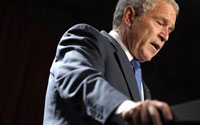Bush claims progress in Iraq campaign. Again
President George W. Bush has made plenty of mistakes in his more than 7Ѕ years in the White House. Critics would say the most grievous was going to war in Iraq.

Now, eager to improve his image, the president is relishing the good news from Iraq more than five years after the U.S.-led invasion. Violence is down to its lowest ebb in four years, and tours of duty have been reduced from 15 months to a year for U.S. Army units heading to Iraq.
"The progress is still reversible," Bush acknowledged Thursday. But he added, "There now appears to be a degree of durability in gains."
And, he said, it was reasonable to expect further reductions in U.S. combat forces - there are 147,000 in Iraq now - "as conditions permit."
If Bush's second and last term can end on an upbeat note in Iraq, some of the criticism of his presidency could ease. But chances of gains in other foreign areas do not look bright.
Violence is on the up in Afghanistan. But unlike Iraq, the president has broader support in Congress for pursuing what is perceived as a war on terrorism in Afghanistan. There are about 34,000 U.S. troops there, and those numbers could be going up.
With fighters crossing the border from Pakistan, the Bush administration has to work hard to shore up relations with Pakistan while also seeking tougher action against insurgents in the border areas.
The impending resignation of Israel's prime minister, Ehud Olmert, who has been battered by allegations of corruption, will set back already slim chances of a peace deal with the Palestinians. It will take up to two months to choose a new leader for Olmert's Kadima party, and if the new leader fails to form a government Israel will hold an election.
All this chews up the time left for Bush to succeed in his goal of a peace accord that sets up a Palestinian state.
On the nuclear front, Iran has resisted efforts to curb its programs, saying they were designed for civilian purposes. More will be known about Iran's intent after Saturday's deadline for a response to a package of incentives offered by the United States and five other world powers in exchange for Tehran curbing uranium enrichment.
North Korea, meanwhile, has provided many details of its weapons programs, but without the license for inspectors to take a close-up look to see whether the reclusive regime is giving up its atomic weapons.
"Nobody is going to trust the North Korean number they have given on plutonium they made," Secretary of State Condoleezza Rice said this week. "The ball is in the North Korean court and we will see what they come up with."
But already the administration is moving to have North Korea removed from a U.S. list of state supporters of terrorism, and officials have met face to face with Iran. The two steps signal some easing of tensions with charter members of Bush's "axis of evil."
Bush, thanks to Iraq, has learned a hard lesson about trying to declare victory too soon.
Eager to report quick progress after U.S. troops ousted Saddam Hussein, Bush five years ago made a "Mission Accomplished" speech, which turned out to be wildly optimistic.
"In the battle of Iraq, the United States and our allies have prevailed," he declared triumphantly May 1, 2003, from the deck of the USS Abraham Lincoln off the coast of San Diego.
Bush was way off the mark.
Subscribe to Pravda.Ru Telegram channel, Facebook, RSS!




